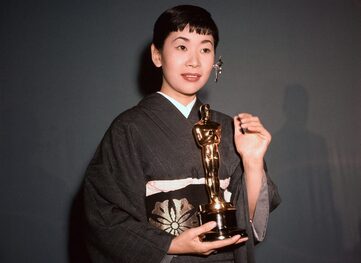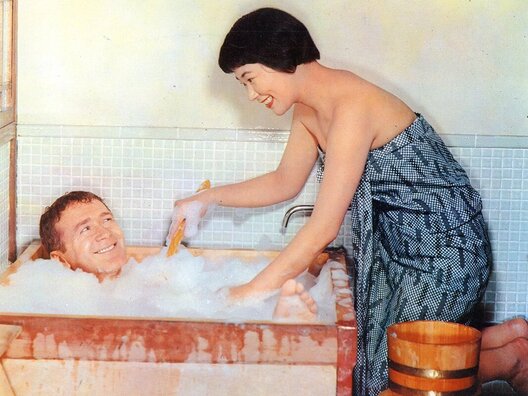 "Miyoshi Umeki with her Oscar" "Miyoshi Umeki with her Oscar" I recently wrote an article about the new film, The Half of It, directed by Alice Wu which won the top Tribeca Film Festival award. It got me thinking, with Asian-American films making breakthroughs in Hollywood recently, are things really changing? Are Asian-Americans going to be represented clearly in the movie industry now? Things may be slowly changing for the better, but it's also important to remember the first Asian-Americans to make a breakthrough in the film industry, and who paved the way for Asian-Americans in Hollywood today. Miyoshi Umeki was a Japanese-born actress who knew from an early age that she wanted to make it big in Hollywood. She would marvel at U.S. films and pretend to be an actress as she pranced around her living room. So, she moved to New York City in 1955 and sought out a career as an actress. Her opportunity came as she signed a contract to become a regular actress on Arthur Godfrey and His Friends. Her biggest achievement yet came when she starred in the film Sayonara in 1957 alongside Oscar winner, Red Buttons. Her stunning performance as the timid Japanese wife of an American airman won her the Oscar for Best Supporting Actress, making her the first (and only) Asian-American woman to ever win the prestigious award. However, her journey in Hollywood wasn't easy at all. Following the aftermath of World War II, Asians--especially Japanese-Americans--were only offered minor, stereotypical roles (which we still see today in many films) that portrayed them in a very cliche manner. Miyoshi Umeki was one of the actresses who had to learn to adjust to these stereotypes in order to make it in the industry. Although she did win an Oscar, it was for playing a role that confined her into a stereotypical box of what a Japanese woman should be according to the Western eye. But for an Asian-American actress in the 1950s, her choices were either to play demeaning and belittling roles or to play no roles at all. Like many other aspiring Asian-American actresses then, she chose the former. When Umeki's husband died in 1976, she took her Oscar, etched her name on it, and threw it away. What may seem baffling to others was a clear decision that Umeki was ready to make. The Oscar symbolized the West's recognition of her playing the suffocating role of a stereotypical Japanese fantasy woman. But Miyoshi Umeki was much more than that, and she said, "I know who I am, and I know what I did," standing up for the first time she had made a decision that didn't fit into the stereotypes that enslaved her during her time as an actress. This said, Umeki's career was incredible, with films and projects garnering her Tony nominations and Golden Globe recognition. She truly serves as a reminder that nothing is impossible, and even in the face of stereotypes, it's possible to make history. And that's what she did. To date, only 3 Asian-Americans have ever won an Oscar, and Umeki remains the only Asian-American woman to win one. In fact, what's baffling is that more white female actors have won Oscars for playing East Asian women. Directors and actresses like Lulu Wang (director of Parasite), Alice Wu, and Miyoshi Umeki have certainly challenged this pattern, but the decades-old stereotypes of Hollywood continue to make it difficult. I hope that we will continue fighting for equal representation of Asian-Americans in Hollywood, to give them the ability to shape and influence pop culture just as much as everyone else. Author: Carina Sun
2 Comments
M. Rust
10/22/2020 12:46:05 pm
excellent article.
Reply
8/8/2023 04:09:15 pm
True, later Myoshi Umeki will play nurse in another sitcom & Asian British widow maid in 'Courtships of Eddie's Father'. She was a great Asian American actress. Same can be said of Caroline Kido. BUT when I watch 'Kill Bill' from Queetin Tarantino, I still think Lucie Liu is still playing another Japanese stereotype [she is Chine-American].
Reply
Leave a Reply. |
In Honor of Asian Pacific American Heritage MonthWe are bringing you the stories of inspirational Asian Americans from history. Read More:5/30/20 - The Exceptional Example Ronald Takaki Set
5/27/20 - The Incredible Legacy of Kalpana Chawla 5/26/20 - When Marrying a Non-American Meant Losing Your Citizenship 5/25/20 - Honoring the 442nd Infantry Regiment 5/24/20- A Glimpse at Asian-Americans in Hollywood -- Miyoshi Umeki 5/22/20 - The Oriental Schools of San Fransisco 5/21/20 - Equality For All Colors - Yick Wo v. Hopkins 5/20/20 - An End To Police Brutality: Peter Yew's Stand 5/19/20 - Finding His Form: Linsanity in 2012 5/18/20 - Internment and Injustice: Fred T. Korematsu 5/17/20 - The Courageous Stand of Gene Viernes and Silme Domingo 5/16/20 - The Unbreakable Spirit of Wong Kim Ark 5/15/20- The Admirable Perseverance of Patsy Takemoto Mink 5/13/20 - The Lasting Legacy of Grace Lee Boggs 5/12/20-Remembering "The Forgotten" -- The Chinese migrants who built America's first Transcontinental railroad 5/11/20 - The Singing Neurosurgeon: Dr. Ayub Ommaya |


 RSS Feed
RSS Feed